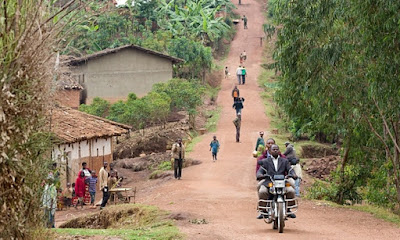The hen contractors and members of the government signed an agreement on the first solar power station in Burundi, the future of this nation full of energy seemed very promising.The next day, shots were heard in the streets and buildings caught fire - a rebel general was trying to take power.
These are the challenges of the use of renewable energy in one of the most unstable countries in Africa. "We were so excited," recalls Sebitereko Lazarus, Program Director for Burundi enterprise specialized in development and social Solar Gigawatt Global. "It has upset us because we wanted to start our project. It does not stop the progression but is slow compared to what we expected. "
Nevertheless, Sebitereko hope that work will begin by the end of the year. They must relate to a solar plant of 7.5 megawatts (MW) that will change the lives of the residents of this small landlocked country, where only one out of 25 for residential access to electricity. The energy will be channeled on 17 hectares in the village of Mubuga (Gitega province), 105 km from the capital, Bujumbura.
Gigawatt Global learns from neighboring Rwanda, where the company opened last year the largest solar field (with a capacity of 8.5 MW) in East Africa. But despite the similarities in climate, topography and culture, Burundi is a risky option and much less predictable.
Sebitereko and Jean-Jacques Nyenimigabo, an adviser to Burundian President visited the isolated site in September during a trip where they were immersed in a landscape of hills and verdant valleys to breathtaking. Mubuga was never electrified and is located 11 km from the nearest power grid.
Nyenimigabo, who was in his own riding, assured the people who listened attentively they would enjoy the benefits of this investment of $ 22 million.
"It would be unfortunate if Mubuga produce electricity for other cities without anyone enjoys," he remarked. "But trust us. Part of this energy will be for local people. Whoever is the beneficiary, it will be among the first to benefit. "
The plant will create 300 jobs in maintenance, construction and assistance, at least 40% for women, had then promised Nyemigabo. "Men spend their money by buying alcohol. With women, we know that the money is used to feed the family."
Gigawatt Global will also distribute 100 solar panels between local leaders. One of them, Manirambona Placide, 34, rejoices: "This project is more than welcome because we live in darkness and are forced to go to sleep when it's dark. We are pleased that this project is accompanied by development initiatives. "
Manirambona adds: "We hope that solar energy will reduce the number of felled trees that are used for firewood and charcoal because electricity can be an alternative in the kitchen. The project will enable us to achieve better results in education. Students who could not do their homework in the dark will now review. Their views will deteriorate further due to inadequate lighting.
If successful, other communities will follow our example because many countries that lack electricity. If the sun can provide us, new perspectives open to us. "
The Burundi certainly needs more energy sources. The installed infrastructure has a production capacity of only 52 MW, 15.5 MW produced by diesel generators. Power cuts affect the lifestyle and severely limit the activities of some sectors such as mining.
Sebitereko think the project, co-financed by American subsidies, the UK, Finland and Austria, also give the community the feeling of owning resources and will have an impact on training and employment in the long term. "The link between the project and education is paramount. Tomorrow we will need technicians and we do not want to be dependent on abroad.
Tomorrow, we will occupy ourselves of maintenance and be part of the system.Among children who grow up with these technologies, there is going to work on these sites, not only as workers but also as technicians. "
However, this great vision was undermined by the recent turmoil in Bujumbura. Protests erupted in April against President Pierre Nkurunziza who was a candidate for a third term, a move widely condemned and considered unconstitutional. It is estimated that at least a hundred people were killed in the clashes.
In May, General Godefroid Niyombare said Nkurunziza was ousted. But the president reaffirmed his control. The failed coup occurred the day after the signing of the contract for the solar plant.
It was the last thing he needed Gigawatt Global. Michael Fichtenberg, its Director General to Burundi, described the context of "worrying" but added: "We ask the international community it brings us funding and allow us to complete this project. "
Source: The Guardian

No comments:
Post a Comment